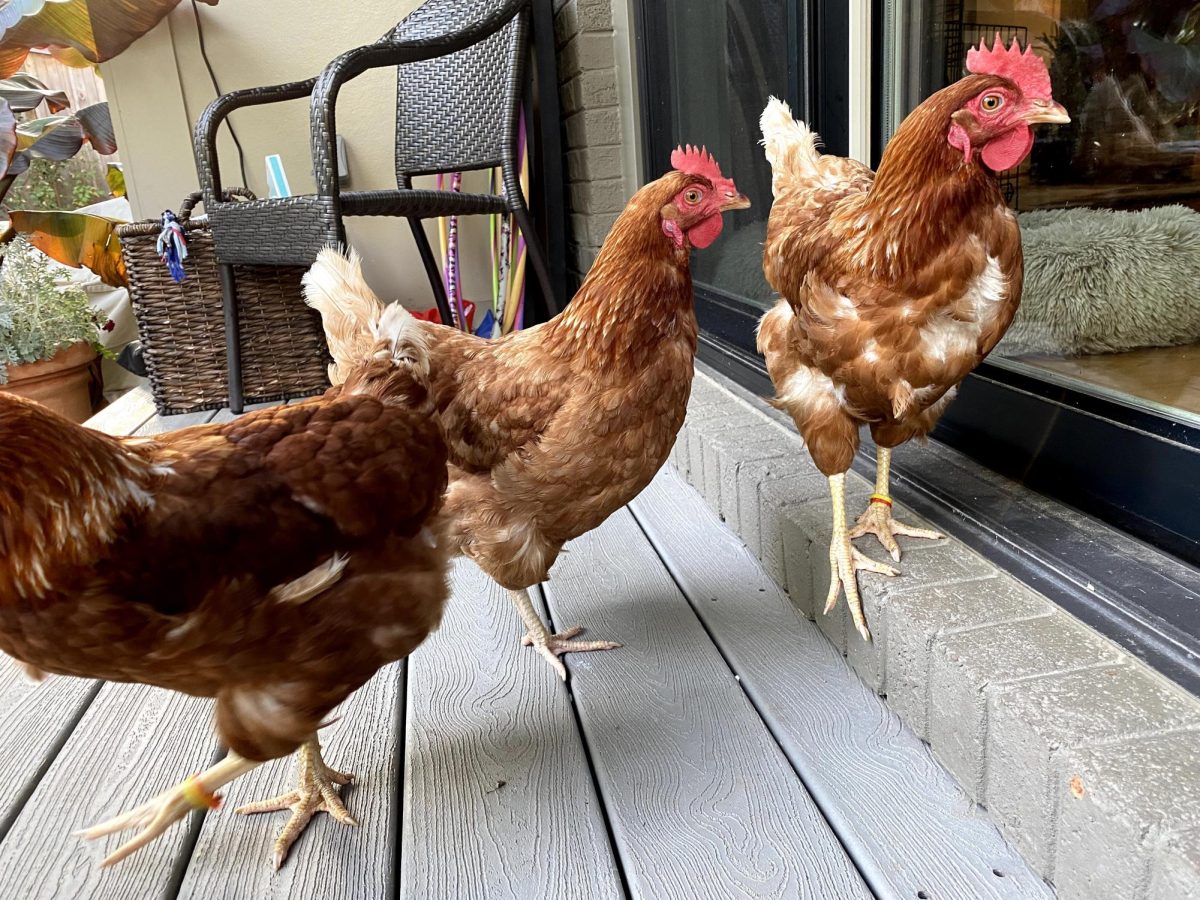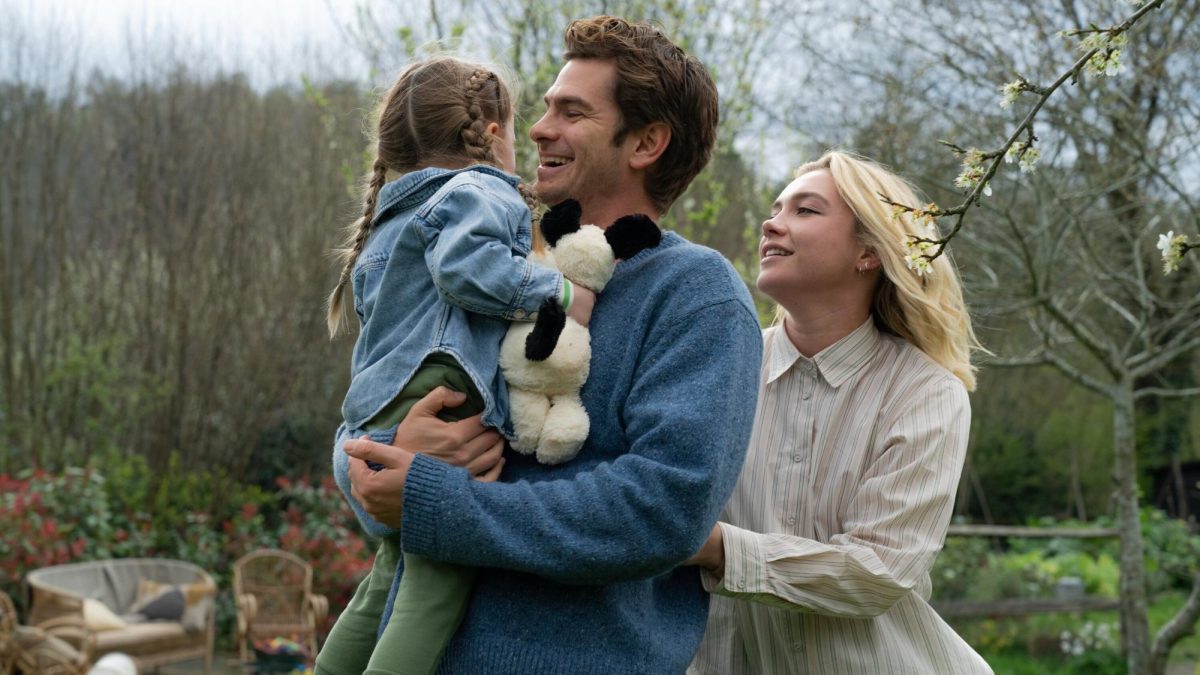Strolling through Bethesda neighborhoods, pedestrians pass by endless suburban front yards featuring lush manicured lawns, towering trees and flower beds blooming with daffodils. For some families, this classic landscaping is merely a facade disguising a unique reality: their backyards house lively coops of chickens.
While chickens are a common sighting across the western hemisphere now, that wasn’t always the case. Chickens are native to southeast Asia and were brought to the Americas from Polynesia and Europe between 1321 and 1407 AD. Today, there are over 33 billion chickens, and approximately 10 million U.S. households raise them.
For some families, chickens are a source of company and comfort. Pyle Middle School parent Jeremy Joseph and his family received their chickens in 2021 from Rent The Chicken, an organization facilitating chicken rentals and adoption. The Josephs cared for their chickens for six months, and the small farm animals became more than just egg-laying backyard pets.
“For us, they were pets who produced food rather than food-producing things that ended up being pets,” Joseph said. “We really enjoyed them and they were really great.”
Whether it be for a continual source of entertainment or fresh eggs to eat with breakfast, raising backyard chickens became increasingly popular during the COVID-19 pandemic. The pandemic provided junior Jack Leotta’s typically busy family with the perfect opportunity to spend time raising chicks, he said.
“COVID had just started and in order to raise them you need a couple of weeks that you can dedicate time to,” Leotta said. “My mom wanted to get chickens, so we figured we had the opportunity and we might as well go for it.”
During the first couple of weeks, the chicks lived in Leotta’s bathtub, and he found that in addition to replacing their food and water daily, it was important to spend lots of time with them so they became acclimated to humans. As the chickens became more self-sustaining, caring for them became easier. After a while, they started naturally going to their coop when it got dark, Leotta said. Even now, he continues to spend countless hours with the chickens.
“It’s a relatively large time commitment,” Leotta said. “Not all at once, but overall, you’re gonna be spending a lot of time with them and taking care of them.”
Joseph’s eighth-grade daughter, Aven, agreed and noted that having a large grassy area and the time to care for and clean up after the chickens is crucial. She also recommended purchasing high fences to speed up the cleaning process. The fences will help keep the chickens in a designated space. For the Joseph family, despite the commitment, raising chickens was a rewarding experience.
“Chickens are really fun. I just would say make sure [that] you have space and at least an hour a day to clean up,” Aven said. “You have to buy the oyster shells, the bedding and keep them safe. There’s a lot of work that goes into it; you can’t just plop chickens in the yard.”
The extensive cleanup is a major difficulty that comes with raising chickens. Leotta noted that backyard chickens are not for people who don’t want to get their hands dirty. Whether it’s changing the bedding, tidying up the coop or dealing with broken eggs, owners are bound to be cleaning up frequently. Despite the hard work, Leotta found that raising chickens has countless benefits and allows him to spend time with animals.
“It’s a lot of fun. You don’t really get to hang out with animals like that very often, so it’s a very interesting dynamic,” Leotta said. “You learn a lot and you spend a lot more time outside than you think you would. If you get interested in it, it’s very cool.”
Another benefit of chickens is their fresh eggs, which leave lasting impacts on a family’s lifestyle even after the chickens are returned. Instead of store-bought eggs, the Josephs began to use the fresher, more humanely sourced eggs in their cooking. Generally, chickens lay around one egg every 26 hours. Fresh, unwashed eggs are sealed by a protective layer called a cuticle and can last for weeks on the counter. The Josephs noticed a dramatic difference in the taste and health of their fresh eggs compared to the store-bought eggs they previously used.
“They taste so much better and they’re so much healthier. You could tell in the color of the yolk,” Aven said. “In some store-bought eggs [the yolk] is very pale yellow and the white is liquid, but for these chickens, you crack the egg into a pan and the yolk is almost red and the white is solid; it doesn’t spread out at all.”
When they returned the chickens, the Josephs switched from using organic eggs to exclusively buying certified humane and pasture-raised eggs. After owning and researching chickens, Joseph discovered that many chickens are kept in terrible conditions, and the quality of their eggs reflects that. His family now goes out of their way to buy eggs raised humanely, he said.
Despite the enjoyment families gain from owning backyard chickens and the lessons they can learn from the experience, some neighborhoods prohibit chickens due to noise control or other disturbances.
In the Bannockburn neighborhood, the Rannoch Road homeowners association strictly prohibits the maintaining, keeping, boarding or raising animals, livestock or poultry of any kind, Rannoch resident Stephen Gibson said.
Furthermore, to avoid health and safety issues that raising chickens can spark, the CDC recommends that owners be aware of risks to ensure the safety of both themselves and the chickens.
While some downsides have caused neighborhoods to prohibit chickens, the benefits outweigh the drawbacks for others. Chickens provide a constant source of humor and entertainment, Joseph said. His family named their chickens using puns: Chickago, Repeckah, Henrietta and Eggclipse.
For Leotta, the chickens cause a few more chores but are a lasting source of fun and amusement. He enjoys hanging out with each chicken and discovering their different personalities.
“It’s definitely worth it despite all the drawbacks because it’s a great experience and it’s a great story to tell,” Leotta said. “It’s different than having a household pet. It’s worth it for sure.”











